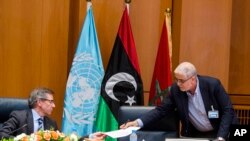Libya's internationally-recognized parliament has rejected a U.N. proposal for a unity government with Islamists.
The exact reason for the decision is unclear, but one report says the lawmakers were upset by amendments to the deal added by the Islamists without their approval.
The U.N. Security Council has urged all parties to sign the power-sharing agreement and threatens to impose sanctions on anyone who tries to block it.
"The agreement offers a real prospect for resolving Libya's political, security, and institutional crises," said Monday's council statement.
Libya has been in chaos and political limbo since long-time dictator Moammar Gadhafi was overthrown and killed in 2011, resulting in violence, terrorism and a collapsed oil industry.
The country is split between an Islamist government that seized Tripoli last year and set up its own administration, and the internationally-recognized government, which fled to the eastern city of Tobruk.
Under the U.N. plan, a member of the Tripoli-based parliament, Fayez Sarraj, would be prime minister. He would have three deputies, one each from the west, east and south.





